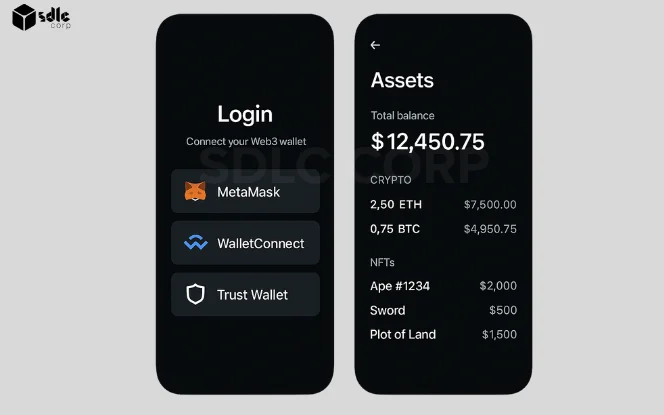The gaming industry is entering a new era of decentralized innovation, led by blockchain technology. By integrating blockchain into game development, developers can offer players true ownership of in-game assets, transparency in transactions, and immersive gameplay experiences with economic incentives. Blockchain games have quickly gained traction, especially those using Play-to-Earn (P2E) models and NFTs, enabling new levels of user engagement and profitability. This guide explores everything you need to know about how to develop a blockchain game in 2025 from technical infrastructure to legal compliance.
Understanding Blockchain Game Infrastructure

Blockchain Networks (Ethereum, Solana, Polygon):
Handle all transaction validation, token transfers, and asset tracking in a decentralized manner.Smart Contracts:
Automate in-game logic such as item ownership, battle outcomes, staking rewards, and marketplace transactions without a central authority.Decentralized Storage (IPFS, Arweave):
Securely store game assets, metadata, and player data off-chain while ensuring accessibility and data permanence.Decentralized Identity Protocols (DIDs):
Authenticate and manage player profiles, ensuring cross-platform and cross-game asset ownership.Immutability & Security:
Prevent unauthorized changes to game data and ensure fair, tamper-proof gameplay experiences.Interoperability:
Enable assets (NFTs, tokens) to be used across different games and platforms within the same blockchain ecosystem.Scalability & Persistence:
Allow games to operate 24/7 with consistent, synchronized world states across all players and servers.
Blockchain Game Development Process

- Conceptualization & Research: Define your game genre (RPG, card, battle arena), the monetization strategy (NFTs, P2E, staking), and player base.
- Platform Selection: Choose a blockchain based on transaction speed, cost, and developer support.
- Smart Contract Development: Build and deploy contracts to manage gameplay rewards, ownership, and asset trading.
- Game Design: Craft engaging mechanics that integrate NFTs, tokens, and wallet features in a player-centric way.
- UI/UX Design: Ensure intuitive wallet connections, in-game purchases, and NFT interactions.
- Testing & Feedback: Conduct alpha/beta testing with real users and gather feedback to refine smart contracts and gameplay.
- Launch: Deploy the game with a strategic marketing and token release plan.
Explore: How to Choose the Best Indie Game Development Partner
Choosing the Right Blockchain Platform
| Platform | Popularity / Maturity | NFT Standards | Fees | Transaction Speed |
|---|---|---|---|---|
| Ethereum | Most popular & mature | ERC standards | Higher gas fees | Slower |
| Solana | High throughput & low costs | – | Low fees | Faster |
| Polygon | Layer-2 Ethereum scaling solution | – | Low fees | Faster |
| Binance Smart Chain (BSC) | Hybrid approach | – | Low fees | – |
When choosing, consider factors like network congestion, gas costs, transaction finality, user adoption, and available development tools.
Explore Why Blockchain And Web3 Are Game Changers For Modern Businesses
Smart Contracts and Tokenomics
Smart contracts define the game’s economic logic and are deployed on the chosen blockchain. They execute automatically without central control, managing:
- In-game transactions
- Player rewards
- NFT minting and transfers
- Token staking, burning, and supply control

- In-game currency: Utility tokens that players earn or buy.
- Governance tokens: Give holders voting rights on updates or new features.
- NFTs: Represent unique assets like characters, weapons, and lands.
- Liquidity and Utility: Ensure tokens are useful and tradable both inside and outside the game.
Explore Unlocking New Possibilities With Advanced Blockchain Development Services
NFT Integration in Blockchain Games

- Minting NFTs: Use standards like ERC-721 or ERC-1155 for unique and batch assets.
- Marketplace Creation: Build an internal NFT marketplace or connect with platforms like OpenSea.
- Rarity Design: Introduce rarity tiers, breeding mechanics, or limited drops.
- Cross-Game Interoperability: Allow NFTs to be used in other games or virtual worlds (metaverse).
Web3 and Wallet Integration

- MetaMask: Browser extension supporting Ethereum-based games.
- WalletConnect: Enables mobile wallet connectivity.
- Trust Wallet: Multi-chain wallet with growing support.
Use Web3.js or Ethers.js to connect wallets, sign transactions, and retrieve asset ownership on-chain. Ensure a seamless onboarding experience for Web2 users by offering wallet tutorials and guest modes.
Testing and Auditing Blockchain Games

- Smart Contract Audits: Use platforms like CertiK or Hacken to review code security.
- Testnets: Deploy your game on testnets (e.g., Rinkeby, Mumbai) for real-world testing.
- Beta Testing: Invite early adopters and collect feedback on bugs, usability, and balance.
- Continuous Monitoring: Use analytics and monitoring tools to track in-game performance post-launch.
Explore The 7 Stages of the Game Development Process
Marketing and Launching Your Blockchain Game

- Build Hype: Use teaser trailers, AMAs, social media campaigns, and pre-registration.
- Community Building: Set up active Discord and Telegram channels.
- Token Release Strategy: Plan IDOs or airdrops to attract early adopters.
- Incentivize Participation: Offer exclusive NFTs or leaderboard-based rewards.
Explore Challenges And Opportunities In Launching A Blockchain Based Game
Technology Stack for Blockchain Game Development in 2025

Estimated Cost to Develop a Blockchain Game
| Tier | Basic MVP | Mid-Level | Full-Scale |
|---|---|---|---|
| Cost | $20K – $30K | $35K – $50K | $60K – $100K+ |
| Timeline | 4–6 weeks | 10–12 weeks | 20–24 weeks |
| Core Features |
|
|
|
| Blockchain Integration | Polygon or BSC | Ethereum + one L2 (e.g., Arbitrum) | Multi-chain or custom L1 |
| Smart Contracts | Basic token + transaction contract | NFT logic + staking rewards | DAO, marketplace, and complex game logic |
| Security & Audits | Standard validation | Contract audit + wallet protection | Full security audit + data encryption |
| Post-Launch | Bug fixes and basic monitoring | Content updates + analytics | Live events + seasonal NFT drops + governance updates |
Future Trends in Blockchain Game Development

- Play-and-Earn: A shift from purely P2E to balanced models that prioritize gameplay.
- Metaverse Integration: Games are becoming interoperable virtual worlds.
- DAOs: Community-driven governance models are letting players vote on game decisions.
- AI Integration: Personalizing gameplay with smart NPCs and adaptive mechanics.
Legal and Compliance Considerations

- Token Classification: Avoid SEC violations by ensuring utility token use.
- GDPR/Privacy: Secure personal data, especially if players are from the EU.
- KYC/AML: Comply with financial regulations if the game involves real-money trades.
- IP Rights: Clearly state ownership and licensing of NFTs and user-generated content.
Conclusion
Blockchain game development in 2025 offers unmatched opportunities for innovation and monetization. With the right tech stack, well-audited smart contracts, community driven governance, and legal safeguards, developers can build engaging, sustainable, and player owned gaming ecosystems. Whether you’re building an indie collectible card game or a metaverse-scale RPG, following these best practices will ensure long-term success.
Ready to build your blockchain game? Hire Blockchain Game Developers and bring your vision to life by filling out our Contact Form our team will get in touch to turn your idea into reality.
FAQ's
What Is Blockchain Game Development?
Blockchain game development involves creating video games that utilize blockchain technology to offer decentralized control, asset ownership via NFTs, and transparent in-game economies.
Which Blockchain Is Best For Developing Games In 2025?
Top choices in 2025 include Ethereum for its maturity, Solana for speed, Polygon for low fees, and Binance Smart Chain (BSC) for balance between performance and cost.

















